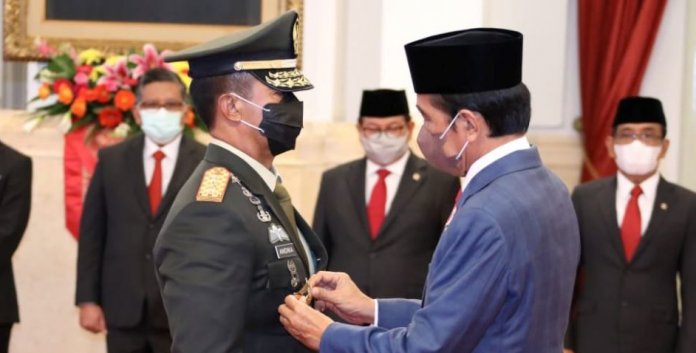A personal spat between two four-star generals spilling into the open has raised questions about military professionalism and elite politics in Indonesia.
The Indonesian parliamentary (DPR) hearing on 5 September 2022 was supposed to be a routine one. DPR Commission I, in charge of security and foreign affairs, met its military counterpart to discuss the 2023 budget. The hearing turned into a brouhaha after an MP from the Indonesian Democratic Party-Struggle (PDI-P, the largest party in the DPR), Effendi Simbolon, complained about the absence of the Army Chief of Staff General Dudung Abdurachman and asked TNI Commander General Andika Perkasa why this was so.
Tempo magazine has reported that Simbolon on at least two occasions in September publicly highlighted the reported squabbles between the two four-star generals, previously known to be close colleagues. Whatever Simbolon’s motive, he scolded the generals for bickering over trivial matters. Simbolon even claimed that the spat has harmed the military, adding that he had evidence of “insubordination, [so much] disharmony, and disobedience” that made the TNI look like a “mob” (gerombolan).
Simbolon’s public statements and various media reports in the past month or two have contributed to the idea that there is now a “cold war” between these two generals. Others have noticed that they are seldom seen at the same events. One key disagreement is General Andika’s reported unwillingness to accommodate General Dudung’s proposed officers for certain promotions and tours of duty in the Army.
The second one is more personal. General Dudung’s son was apparently rejected for admission to Indonesia’s Military Academy (Akmil) for being two months short of the minimum age of entry, which is 17 years. General Andika has the final decision on access to Akmil, but General Dudung, a previous Akmil governor, took this as an insult. General Dudung in July 2022 wrote to appeal the decision and to ask Akmil to increase its intake. General Andika has explained that General Dudung’s son was later accepted as a cadet.
Simbolon’s rebuke of the generals seemingly stirred outrage on social media, where several soldiers and mid-level officers expressed their fury. He even received death threats over his remarks.
Later, however, it was revealed that General Dudung apparently instigated these threats against Simbolon. Detik.com, Indonesia’s oldest and largest online news media outlet, uploaded a video in which General Dudung was seen allegedly encouraging his men, soldiers and officers, to fight Simbolon. General Dudung criticised the officers for being silent about Simbolon’s insult.
After such intimidation, Simbolon apologised. Tempo magazine revealed that PDI-P leaders had pressured Simbolon, as they were supposedly worried that a conflict with the military could affect the party’s chances in the upcoming 2024 elections. On his part, General Dudung has dismissed the rumblings of discontent by saying that it was “normal” for General Andika and him to have “some disagreements”.
The incident is a reminder that civilian politicians must be cautious when suggesting that there are conflicts and rivalries within the TNI. Whatever the real situation is behind the scenes, the TNI remains a strong institution that has a symbiotic relationship with those that wield political power.
…the fracas has highlighted how it is more important for Indonesia’s civilian politicians and military generals to jointly professionalise TNI soldiers and officers.
When the remarkable careers of General Andika (Akmil ’87) and General Dudung (Akmil ’88-B) are analysed, in the eyes of many Indonesians, both generals have done well not just because of ability and merit but also their patronage relationships with certain political parties and politicians. Both have solid secular-nationalist credentials. Both are linked to the president and those at or close to the PDI-P’s leadership orbit.
General Dudung’s father-in-law, retired major-general Cholid Ghozali, is the founder of Baitul Muslimin, the PDI-P’s Islamic wing. As commander of Jakarta (Kodam Jaya), General Dudung caught President Joko Widodo’s attention because he took down Islamic Defenders’ Front (FPI) leader Habib Rizieq’s banners and billboards from the streets. He has held key appointments including his present one of Army chief of staff (Kasad) and served for eight months as the TNI’s strategic reserves (Kostrad) commander.
General Andika’s father-in-law is former Indonesian intelligence czar, retired general AM Hendropriyono, who is still close to PDI-P chief Megawati Sukarnoputri. General Andika’s spectacular and speedy rise through the ranks after returning from studies in the U.S. in 2008 saw him in posts such as chief of the Army’s information division, head of the presidential security squad, Kostrad commander, and Kasad.
General Andika will not stay long as the 21st commander of TNI, because he must retire in December when he turns 58. He has tried to extend his appointment by arguing that the retirement age is unconstitutional, but the Constitutional Court has rejected this tactic.
Some have said that Jokowi was “displeased” to hear of this feud and is supposedly deciding where to place both generals. Several alternatives for General Dudung are reportedly being considered. It is up to President Jokowi to decide how these two generals should be dealt with, if at all, for their personal spat going public.
Although remote at this point, the possibility of an emboldened military against civilian control stirs up bad memories of incidents like the 17 October 1952 affair. Then president Sukarno had to talk down demonstrators and soldiers surrounding the Merdeka Palace, following the military’s displeasure at what it saw as excessive civilian meddling in restructuring the defence ministry and the armed forces.
Simbolon might have apologised to the TNI but the fracas has highlighted how it is more important for Indonesia’s civilian politicians and military generals to jointly professionalise TNI soldiers and officers — following Samuel Huntington’s concept of “objective control”, where civilian control of the military is exercised by professionalising it. Whether spontaneous or orchestrated, Dudung getting low- and mid-ranking soldiers and officers to intimidate politicians is unprofessional and a far cry from Huntington’s theory./ BY MADE SUPRIATMA/ FULCRUM




